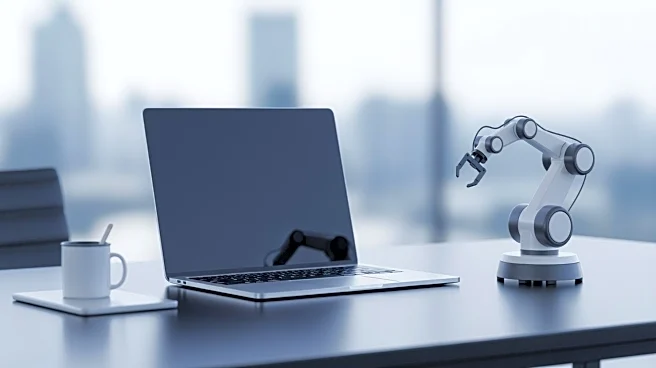What's Happening?
A recent survey conducted by AIResumeBuilder.com reveals that three in ten U.S. companies plan to replace employees with artificial intelligence next year. This shift is driven by increased automation
across various industries, including information technology, accounting, and human resources. The survey indicates that 59% of business leaders expect AI to replace 10% or more of their current workforce, while 10% anticipate AI will replace 50% or more. The report highlights the need for leaders to leverage human potential strategically, even as AI automates monotonous tasks. The survey also notes that U.S. employers announced 153,074 job cuts in October, a 175% increase from the previous year, with AI-driven automation cited as a significant factor.
Why It's Important?
The planned workforce replacement with AI technology signifies a major shift in the employment landscape, potentially affecting job security for many workers. Industries such as IT, financial services, and manufacturing are likely to experience significant changes, with roles in customer service and administrative support at high risk of automation. This trend underscores the need for businesses to adapt by redefining job responsibilities and focusing on strategic, high-value work. The rise of AI in the workplace could lead to increased efficiency and business expansion, but also poses challenges in terms of workforce displacement and the need for reskilling.
What's Next?
As AI adoption continues to rise, companies will need to develop strategies to integrate AI while maintaining human expertise. This may involve redefining roles and responsibilities to focus on strategic tasks that cannot be automated. Business leaders are expected to take phased approaches to AI implementation, building literacy and capability among teams to ensure AI augments rather than replaces human expertise. The ongoing shift may prompt discussions on workforce reskilling and the development of policies to address potential job displacement.
Beyond the Headlines
The ethical implications of AI-driven workforce replacement are significant, raising questions about the balance between technological advancement and human employment. Companies may face scrutiny over their approach to automation and its impact on workers. Additionally, the cultural shift towards AI-driven processes may influence workplace dynamics, requiring new management strategies to foster collaboration between human and AI resources.










